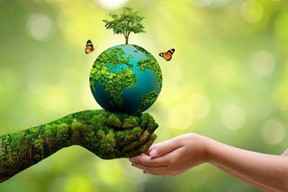ECOLOGY IS THE WORLD’S PERMANENT ECONOMY
ECOLOGY IS THE WORLD’S PERMANENT ECONOMY
Why in the news?
- The principle “Ecology is the permanent economy,” popularized by environmentalist Sunderlal Bahuguna, is gaining renewed attention in policy and public discourse.
- Recognizing this principle encourages prioritizing ecological health as the foundation for Human survival, Economic stability, and Climate resilience.
- It highlights that environmental conservation is not merely an idealistic goal but a pragmatic and enduring basis for sustainable development.
Relevance of the Principle
- Serves as a powerful reminder that human prosperity is deeply connected to the health of the environment.
- Emphasizes that economic development cannot occur without the use of natural resources, and economic stability is not possible without their conservation.
- Highlights the urgency of this idea in the context of growing global crises such as:
- Climate change, and
- Accelerating biodiversity loss.
-
Urges reflection on whether we have genuinely understood and internalized this ecological-economic interdependence.
Striking the Right Balance: Science and Nature
- Understanding the complexity of nature lies at the core of scientific inquiry.
- Scientists use observation, experimentation, and modelling to grasp ecological systems.
- This knowledge is vital for tackling challenges like climate change and guiding sustainable development.
- However, beyond scientific insights lies a more urgent truth: Ecology is the real economy — our survival, security, and progress depend on it.
- Sustainability, in simple terms, means balancing environmental protection with economic development.
-
Without this balance, neither the economy nor the environment can sustain itself in the long term.
Human Disconnection from Nature
- Though humans are part of the animal kingdom, civilization has led to a growing detachment from nature.
-
This disconnection is a key driver of biodiversity loss, as identified in the IPBES Transformative Change report.
Evolution of Resource Use
- In early history, nomadic humans used natural resources only for immediate survival.
- As societies evolved:
- Individual use turned into community consumption.
- Eventually, nations began large-scale resource exploitation to meet growing and future demands.
-
This led to global competition over natural resources, driven by anticipatory needs for future development.
Contrast with Other Species
- Unlike humans, no other animal exploits resources on such a large scale for future use.
- Other species take only what is needed for immediate survival, maintaining harmony with ecosystems.
-
This highlights the unique and unsustainable trajectory of human development in relation to nature.
New Complications
- Escalating Environmental Strain
- The intensifying cycle of human consumption and global competition has placed extreme pressure on ecosystems.
- This has led to an unprecedented acceleration of climate change — a natural process now dangerously amplified by human activities.
- Nature-Based Solutions: A Double-Edged Sword
- In response, nature-based solutions have been promoted as part of global conservation strategies.
- These solutions aim to:
- Leverage ecosystem resilience to counter climate change,
- Restore biodiversity, and
- Promote sustainable development.
- However, a paradox arises:
- We continue to exploit natural systems to fulfill human needs and greed,
- While simultaneously relying on these systems to buffer us from environmental consequences.
- This dual dependence deepens ecological imbalances and complicates climate action.
- Reframing the Approach
- Beyond scientific understanding, it is crucial to accept the foundational truth: Ecology is the permanent economy.
- This recognition shifts the focus from short-term exploitation to long-term ecological stewardship.
- Ecological health must be viewed not as a limitation, but as the cornerstone of: Human survival, Economic stability, and Climate resilience.
- A Moral and Existential Reckoning
- This realisation is not just timely — it is essential for addressing the current environmental crisis.
- It calls for a shift from reactive conservation to proactive planetary sustainability.
-
The climate crisis must be understood not only as a scientific challenge, but as a moral and existential reckoning tied to the ecological foundations of human life.
The Need to Reconnect with Nature
- Accelerating Environmental Change
- Climate change and shifts in biodiversity patterns are not new to Earth.
- However, the current rate of change is alarming and harmful, largely driven by unsustainable human activities.
- The impact extends to all forms of life, including humans.
- Inner Transformation is Essential
- To address the crisis effectively, the change must come from within — through personal responsibility and lifestyle choices.
- Since development is ultimately aimed at meeting human needs, each individual must adopt a sustainable lifestyle.
- This is key to the success of global sustainability efforts.
- Humans: A Part of Nature, Not Apart from It
- True sustainability begins with the realisation that humans are inseparable from nature.
- Modern lifestyles, driven by technological progress, have distanced us from nature.
- However, humans possess a unique emotional capacity to reconnect with the natural world.
- Emotion as a Path to Conservation
- Conservation efforts should aim to strengthen the emotional bond between people and nature.
- This emotional reconnection can drive more meaningful and lasting ecological action.
- The Guiding Principle
- The idea that “ecology is the permanent economy” is not just insightful — it is imperative.
- This realisation should anchor our conservation and sustainability efforts, more so than merely understanding ecological complexity.
Source: https://www.thehindu.com/opinion/op-ed/ecology-is-the-worlds-permanent-economy/article69572346.ece
Mains question (250 words)
Discuss the relevance of the principle “Ecology is the permanent economy” in the context of sustainable development. How can emotional reconnection with nature support conservation efforts?




